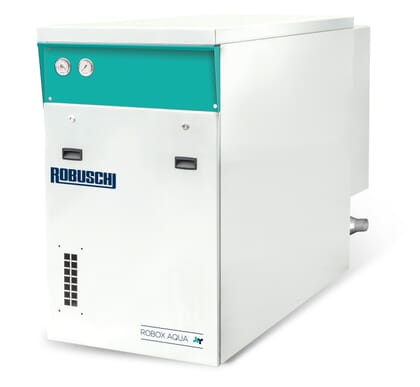Gael Force Group is a manufacturer and supplier of feed barges for the aquaculture industry. These are built in Inverness and Fort William, and in operation in a range of locations across the west coast of Scotland, including Argyll and the Outer Hebrides.

These feed barges contain compressor and blower technology to help on-site staff feed and care for their stock. The feed lines require low pressure, high volume technology to ensure the air flow rate remains at a suitable level when delivering feed to the pens holding the fish, achieved via a pneumatic conveying system. This is because the feed pellets are susceptible to damage and can be easily lost while being conveyed. Compressed air is also used for a range of other operational processes, such as conditioning and aeration during farm treatments.
A common challenge for feed barges in the aquaculture industry, however, is available on-board space. Neil MacDonald, Project and Design Engineer at Gael Force Group, explains: “Over the last year we have installed the 22 kW and 30 kW Robox ES45/2P units onto our barges, plus the new 30 kW Robox Aqua technology. While using the standard Robox blowers for typical installations, we sometimes have to contend with tight space restrictions. The Robox Aqua is very effective at increasing our capacity, with a reduced footprint over the standard Robox unit.
“In fact, the reduced width of the Robox Aqua enabled us to win a contract for an eight-blower system, which would not have been possible with the standard Robox unit. Typically, there would have only been space for six fish feeding lines, but the new Robox Aqua meant eight could be accommodated – a big benefit to our customer, as it meant they could increase the barge’s output capacity.
“While relatively new to the industry, the Robox Aqua uses the same technology as the ES and EL models, but the system is directly driven, rather than the belt arrangement that’s currently in place in the ES units. In the long run, we believe this will offer us reduced maintenance and longer service life.”
The Robox Aqua rotary lobe blower can allow for pressure up to 1000 mbar (g), volume flow up to 700 m3/h and motor power up to 30 kW. Its innovative design utilises direct coupling to avoid transmission losses and reduce servicing costs. The unit also consists of fewer components for ease of installation and increased reliability, and its improved sound enclosure can reduce noise levels to lower than 80 db(A).
Thanks to its compact design, three side-by-side Robox Aqua units can fit into the same space as two conventional blowers. Its modular and stackable design also allows units to be installed on scaffold structures, making it ideal for barges with very limited available space.
Neil continues: “The Robox Aqua units have been operational on-site since September 2018 and have run without issue during this period. The fact there has not been a single issue with the installed units during this time is commendable.
“The Robuschi team have been very supportive throughout, with any questions being answered swiftly and requests for further information being efficiently passed along. Our dedicated account manager also has extensive knowledge of the Robox product, which is incredibly useful when it comes to specifying, operating or identifying any potential faults with the technology.”
Umberto Onetti, Aquaculture Key Account Manager at Gardner Denver, said: “With barge space often at a premium, the small footprint and excellent performance of the Robox Aqua makes it a very attractive solution to those in the aquaculture industry. It can help increase capacity, ensuring Gael Force Group’s customers can meet their requirements.”

